The
show was sandwiched in between two other major
conferences in the City by the Bay,
AdTech just before and Web 2.0 immediately
after. Roundtable pulled some
people from each but that gain was offset by the
dates conflicting with the Passover holiday that
kept some domainers of the Jewish faith at home or
resulted in them leaving early for seders
(traditional dinners) Saturday night. This
would turn out to be the last Roundtable show staged under
Jay Westerdal's Name Intelligence, Inc. Soon after the show
ended it was announced that he had sold the company to
Los Angeles based Thought Convergence (parent
company of TrafficZ.com).
The happy marriage soon hit the rocks and the two sides wound up
suing each other (the dispute was still in the court system
as if this writing). Even so, Thought Convergence has kept the
Roundtable conference alive. |
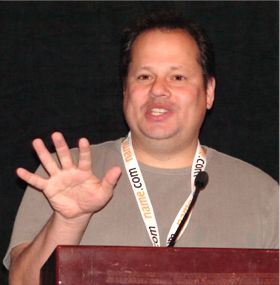
Former
Sex.com owner Gary Kremen
giving his keynote speech
at Domain Roundtable 2008 |
For
the GeoDomain Expo, 2008 brought a July return
to Chicago where the conference had been born
two years earlier. This was a superb show that cinched my
belief that the geodomain community is doing some of the
most important work in our industry by showing the rest of
us a path to success through development that can
free domain owners from the whims of the search engines
giants, Google and Yahoo, who sit at the top
of the PPC pyramid. Most mainstream conferences have
borrowed from the geo community's theme and incorporated a
greater emphasis on development in their own shows. Despite
softening attendance at many shows, still another competitor
entered the conference ring in 2009. Domainer
Mardi Gras debuted with a well received show in New
Orleans in February 2009 - right in the middle of the
world famous Mardi Gras celebration. Though there were some
content sessions the emphasis was clearly on social
networking for this event and that was fine by DMG guests.
There is no better place for a party that New Orleans during
Mardi Gras and that combination served as a differentiator
that helped DMG carve out their own niche in a crowded
field. 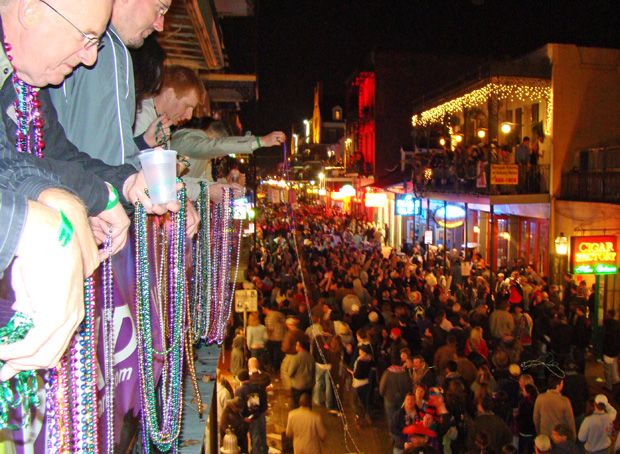
Guests
at the 2009 Domainer Mardi Gras conference in New
Orleans got a birds eye view
of the Mardi Gras celebration on Bourbon Street from
their own private balcony. 2009 was
also a breakout year for DOMAINfest Global (DFG) who made
some huge waves with a little party of their own - at the Playboy
Mansion. That helped boost both their turnout and the
buzz for DFG in general. The headline of our show review
article
"Triumph
in Tinseltown: DOMAINfest Global 2009 Raises the Conference
Bar" summed things up pretty well. 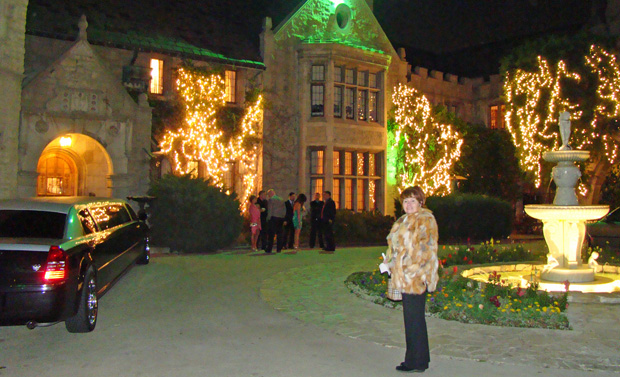
Guests
begin arriving at the Playboy Mansion party
staged
by DomainSponsor at the 2009 DOMAINfest Global
conference 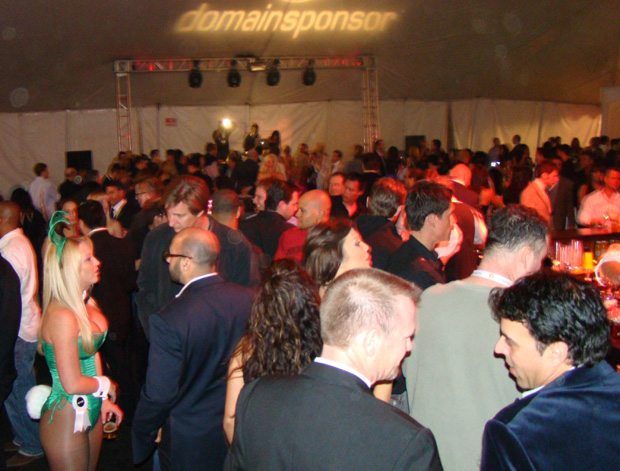
Inside
the DomainSponsor tent at the Playboy Mansion This
show looked like a million dollars, largely because
that's how much it cost to produce. Which brings us back to
the question I asked a few paragraphs back, "how do you
produce a big budget world class event without losing
your shirt?" Well, it helps to have a lot of shirts
(as DOMAINfest parent Oversee.net has) and to be able to
allocate the loss of some of those shirts to your marketing
budget. Revenues
at the gate may not cover the show expenses, but the
promotional value that Oversee gets for their DomainSponsor,
Moniker and SnapNames units more than makes up the
difference. They are going spend that money on one form of advertising, marketing and promotion or another.
Spending it on an unforgettable conference where you get to
interact face to face with your current and potential future
customers is a smart play on their part. This
is where T.R.A.F.F.I.C. was at a disadvantage in 2009. They
had no other businesses to promote, so they had to make
their money at the door or through auction commissions and
sponsorships (this situation changed when Rick Latona
became a T.R.A.F.F.I.C. partner for the 2010 shows - more on
that in a moment).
|
| With
the general economy now in freefall, Schwartz and Neu
decided to run just two domestic shows in 2009 while
licensing rights to a third - their first European show - to
Latona. They started by seeing if they could recapture the
magic of their 2006 Silicon Valley show with a
return to Santa Clara in April 2009. The show
was the fourth major conference in a string of six that
various promoters shoe-horned into the first six months of
2009 and that fact combined with the weak economy kept
attendance down at the same 200 level they had seen the
previous spring in Orlando.
Even
though the crowds were smaller the quality was still
very high because the costs of attending shows is less
of an issue for the most successful |
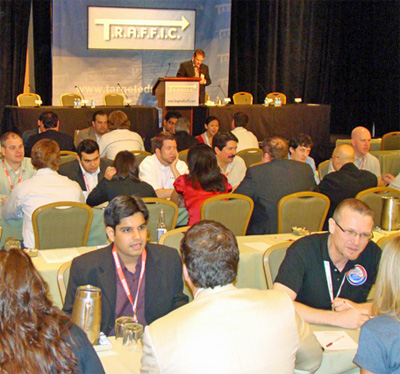
Networking
session at T.R.A.F.F.I.C. Silicon Valley 2009 |
| domainers than it is for
those just starting out or still working their way up the
ladder. That means that even though smaller crowds are not
good for promoters who have to deal with sky high fixed
costs, they can be advantageous to attendees who want to meet
successful industry veterans who can have a real impact on their
business. You often miss making many of those connections
when the shows are twice as large. |
In
June 2009 T.R.A.F.F.I.C. went to Europe for the first
time with a ccTLD
themed show in
Amsterdam staged under license by Rick Latona
and his team. I thought this was a great show as it gave
everyone a chance to make dozens of new contacts from the
other side of the pond while enjoying the many attractions
in one of Europe's most popular cities. 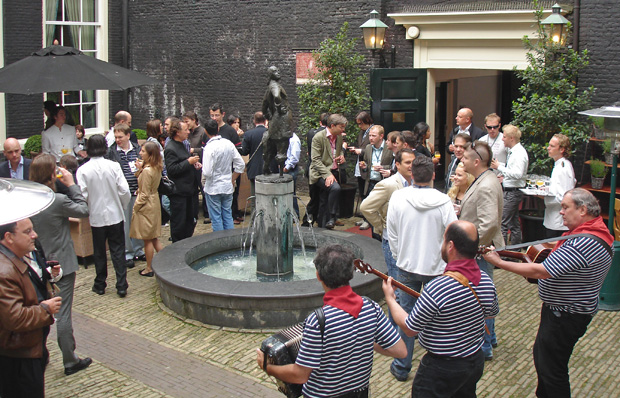
Cocktail
party in the courtyard at the historic West Indies House
in Amsterdam
during the T.R.A.F.F.I.C. cccTLDS conference in
June 2009. Just days after this
successful show, Latona and T.R.A.F.F.I.C. co-founders announced
a new partnership starting in 2010 that would have
Latona running four more shows outside the U.S., plus one in
the States while Schwartz and Neu handled just one mega show
set for Miami's South Beach October 17-20, 2010.
T.R.A.F.F.I.C. closed out its 2009
schedule with an October
return to New York that was accompanied by a
good crowd of about 300 even though an ICANN meeting
was running in Seoul, Korea at the same time, pulling
away many people who would have been at T.R.A.F.F.I.C.
otherwise. It was a good way for Schwartz and Neu to end a
non-stop five year run before taking a well deserved year
off before they saddle back up, renewed and refreshed, for
that South Beach show next fall.
|
Oddly that T.R.A.F.F.I.C. New York show
was the only major show in the second half of 2009. Six
others had squeezed into the first six months of the year.
Domain Roundtable was the last show in that conga line with a June
event in Washington, D.C. - their first event
with new owner Thought Convergence in charge.
With so many
conferences running in front of it and the economy still a
huge albatross, attendance was predictably light but that
didn't stop show producer Laura Schmidt and her team
from staging a first class high value event that registrants
really appreciated.
The 2009
GeoDomain Expo was held in sunny San Diego
in April, right before T.R.A.F.F.I.C. Silicon Valley and
that event continued to delight its unique audience of
geodomain developers.
That brings us to 2010, the
busiest conference year to date. Just two months into the
New Year we already have three shows under our
belts; T.R.A.F.F.I.C. Las Vegas and DOMAINfest Global in
January and Domainer Mardi Gras in February.
|
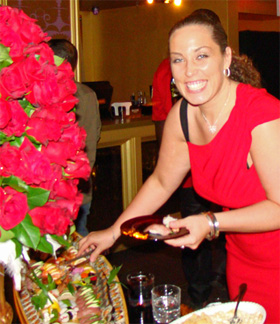
Laura
Schmidt (Thought Convergence)
making sure everything is just right
for guests at the company's
2009 Domain Rountdable conference. |
The 2010
T.R.A.F.F.I.C. Las Vegas show held at the Hard
Rock Hotel was the first U.S. conference staged by Rick
Latona under his new partnership agreement with Rick
Schwartz at Howard Neu. Like
all T.R.A.F.F.I.C. shows this one proved to be a crowd
pleaser, but attendance stayed in the same range as the 2009
shows other than New York where a considerably larger crowd
turned out.
|
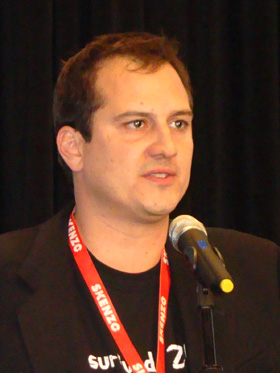
Rick
Latona welcoming attendees to the
2010 T.R.A.F.F.I.C. Las Vegas conference. |
I mentioned earlier that with no other businesses to promote,
Schwartz and Neu's compensation was limited to the
revenue they could generate from their show.
Latona on the other hand has a major auction
platform (Latonas.com)
and a popular sales newsletter to promote.
T.R.A.F.F.I.C. doesn't have to make a lot of money
(or even turn a profit) for him to still get a
lot of value out of running the show and its
auction (as part of his partnership arrangement
Latona became the sole auction provider for
T.R.A.F.F.I.C.). Still Latona can't and won't
ignore the bottom line as he also has to make sure
his new partners make money from the asset they
entrusted him to run.
Despite being the pioneers in this space,
Schwartz and Neu showed they have no intention of
standing pat. With the Latona partnership they are
continuing to push the envelope with a bold move
into international markets that will take the domain
story (and the T.R.A.F.F.I.C. brand) to new locales
around the globe (this year alone, T.R.A.F.F.I.C.
will appear for the first time in Italy, Canada,
Ireland and Hong Kong). By the time
they come back home for the South Beach show in
October, nine |
| months will have passed
between domestic T.R.A.F.F.I.C. conferences I expect
the pent up demand (along with the world famous
location) to result in a monster show. |
With a year to prepare and talented
staff that runs their show with military precision,
Oversee's DomainSponsor unit drew a record crowd (in the
650-700 range) to the 2010
DOMAINfest Global conference that moved across
town from Hollywood to Santa Monica. This
impressive conference clearly established DOMAINfest Global
as a can't miss event.
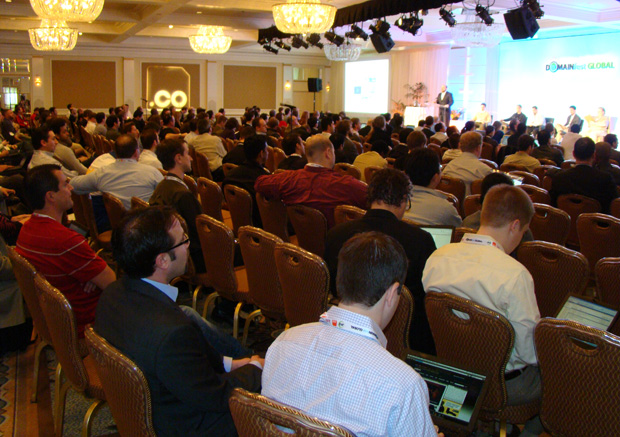
The
2010 DOMAINfest Global conference drew the show's
biggest crowd yet.
Oversee will now try to duplicate the
success they have had with this show overseas through a
recently announced DOMAINfest Europe conference that
will be held in Prague, Czech Republic October 6-7,
2010.
The
2010
Domainer Mardi Gras conference also served notice
that it intends to be more than just a massive party. Under
the direction of new Executive Producer Michael Ward,
DMG had some great seminars this year giving the event a
double barreled agenda that gave attendees a great week in
terms of both business and pleasure. This show, backed by Parked.com,
will remain an annual event that, with its unique Mardi Gras
setting and strong post-show word-of-mouth buzz, should
continue to attract an audience despite the strong
competition. 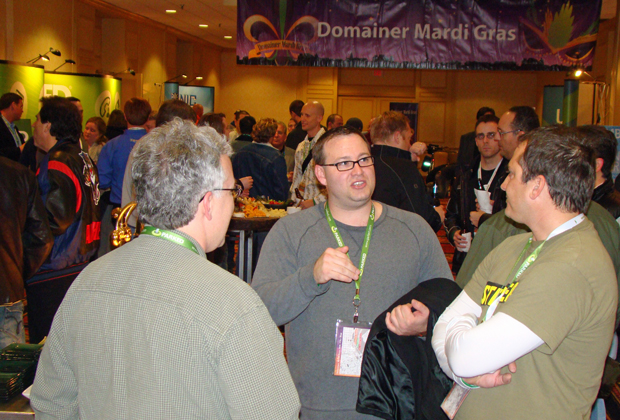
The
2010 Domainer Mardi Gras conference expertly combined
business and pleasure.
As we move forward
from here, the next two shows on the schedule illustrate the
problem promoters now have in trying to find an open spot on
the calendar. The 2010
GeoDomain Expo locked in April 28-30
dates in New Orleans long ago. With six T.R.A.F.F.I.C.
shows to fit into the calendar, Latona wound up having to
scheduled his upcoming Milan, Italy show on
conflicting dates - April 27-29. Since
the two shows have completely different themes (T.R.A.F.F.I.C.
Milan will focus on ccTLDs, the GeoDomain Expo on .com
development), have a relatively small amount of crossover
between their audiences and sponsors, and will be held on separate
continents, the conflict shouldn't have a huge impact on
either show. Still, it is not a good situation as the
industry's focus will have to be divided between two events
going on at the same time. October
2010 will be another particularly busy month with three
shows scheduled to run consecutively; DOMAINfest Europe
(Oct. 6-7), DNCruise (October 11-15) and T.R.A.F.F.I.C.
South Beach (October 17-20).
|
All of which brings us
back to the question posed in the headline for this
article - "Can the shows survive
oversaturation?" My answer is an emphatic
yes - they will certainly survive (perhaps
not every single one but as a class, domain
conferences will remain an indispensible part
of the industry). The shows provide too much
value for attendees, who overwhelmingly love the
conference experience, for them to go away. For
attendees "oversaturation"
just means having more great options to choose
from. For
the show promoters and their sponsors the game has
become a lot tougher though. The audience pie
is being split a lot of different ways so for most
the revenue stream has been cut. Normally you would
expect a wave of consolidation to be kicking in but so far
none of the promoters has blinked. In fact in
seems like every year a couple more enter the
fray. |
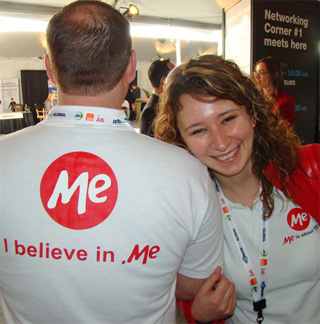
Attendees
love conferences because they help
them take their businesses to new heights. |
Some, especially
those who can't draw funds from a marketing budget to
underwrite the high cost of show production, will, sooner or
later, have to trim some expenses (perhaps food bills,
opening night cocktail hours or extravagant parties) to keep
their costs in line with revenues. In
the past sponsors have helped underwrite a lot of those
expenses but with so many shows in operation, the sponsors -
despite having a desire to be wherever domainers
gather - have only so much money they can allocate to
promotion at conferences. So,
going forward, I don't expect every conference to be
a mind blowing extravaganza (though we will certainly
continue to see some of those). Those that are not like the Super
Bowl, World Series and March Madness all
rolled into one will still offer plenty of value -
especially in the area attendees say is most important to
them - networking opportunities.
|
|
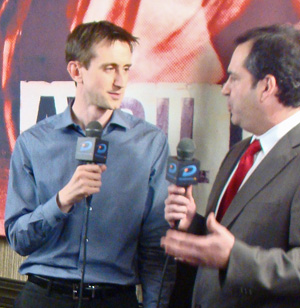
Morgan
Linton (left) interviews Rick Silver
(N49.com) for his Domainvestors.TV series. |
Over the years I have
seen many industry newcomers catapult their
businesses to a new level of recognition and success
by getting out there on the show circuit and meeting
people face to face. There is no substitute
for that. Over the past 6 months I can point to
people like Bruce
Marler, Morgan
Linton and Patrick
Ruddell (Chef Patrick) as prime examples
of what I mean. The
shows will always have an audience because they
provide an invaluable service. It will be up to the
individual promoters to find a model that works for
both them and their guests so that conference
organizers can maintain (or grow) their share of the
show pie (most have already done that). As time goes
on, market forces will balance supply and
demand for conferences - just as they do for almost
every other product or service. |
|

















